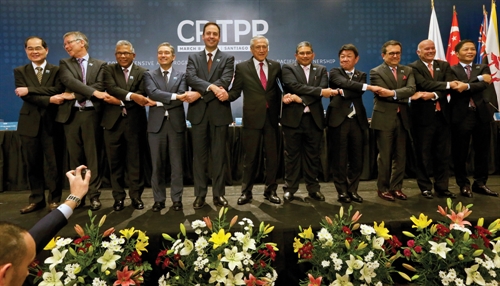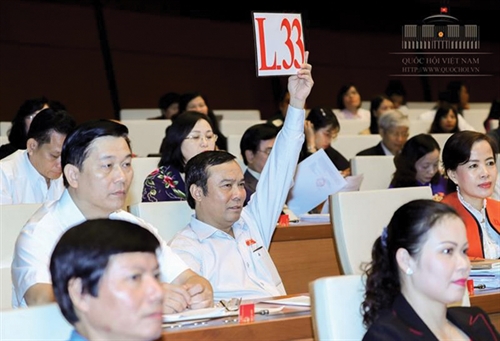Retention of title, a measure to secure performance of obligations, is one of novel contents of the 2015 Civil Code. In this article, the author analyzes the Code’s provisions concerning retention of title, the right to reclaim property and effect for a third party, and makes recommendations for future improvement
Assoc. Prof. Dr. Duong Anh Son
University of Economics and Law
Vietnam National University, Ho Chi Minh City
Retention of title
According to Article 331 of the 2015 Civil Code, under a purchase and sale contract, the seller may retain the title to property until the buyer fulfills the payment obligation. Retention of title should be stated in the purchase and sale contract or in a separate document and will become effective for a third party from the time of registration at a secured transaction registration center. Some jurists view that these provisions aim to guarantee the harmony of interests of the seller and buyer.[1]
As regulated by many foreign civil laws, retention of title may only be effected when i) the seller accepts the buyer’s deferred payment under the purchase and sale contract; and ii) retention of title is agreed upon in the contract. However, Vietnamese civil legislation seems to be inconsistent on this issue. Article 331.2 of the 2015 Civil Code indirectly stipulates that retention of title may only be affected when it is so agreed upon in the contract or stated in a separate document. Meanwhile, under Article 453.1, the parties may agree on the buyer’s deferred or installment payment within a certain period after receiving the bought property. The seller may retain the title to the sold property until the buyer pays the full price, unless otherwise agreed upon.
 |
| Locals fill out formalities at the single-window section of the Hanoi Land Registration Office in Thanh Xuan district, Hanoi__Photo: VNA |
Article 331 implies that the seller is only entitled to retain the title to the property until the buyer fulfills the payment obligation, and such retention will terminate at the time this obligation is fulfilled.[2] If the buyer performs the payment obligation prior to or upon the receipt of the property, then the seller has no right to retention of title. Article 453[3] also provides retention of title to property and the buyer’s entitlement to deferred payment. However, the bases giving rise to retention of title are different: there is an agreement on retention of title under Article 331 and retention of title is automatic under Article 453. According to Article 453, the necessary and sufficient condition for the seller to retain title is that the buyer has not fulfilled the payment obligation (he makes deferred or installment payment). Meanwhile, under Article 331, this is just the necessary condition for the seller to retain title; the sufficient condition is the parties have an agreement on such retention).
Contract is an agreement of the parties aiming to establish, change or terminate their rights and obligations. Article 453 states that under a contract on purchase on deferred or installment payment, retention of title is automatic, regardless of whether the parties have an agreement on this, while the seller does not have this right only when it is so agreed in the contract. In principle, the law should make mandatory provisions only in case of necessity to protect the interests of the State, the society or a third party. In the author’s opinion, for this type of contract, retention of title does not fall into the above cases, so it should be based on the parties’ agreement, not be made mandatory by the law. Therefore, Article 453 appears not only contradictory to Article 331 but also impractical and infeasible.[4]
The right to reclaim property
Pursuance to Article 332 of the 2015 Civil Code, in case the buyer defaults on payments as agreed upon, the seller may repossess the property and will refund the buyer the sum of money paid by the latter after subtracting the decreased value of the property due to use. If the property is lost or damaged, the seller may claim compensation.
If the property remains in the buyer’s possession and maintains its initial conditions, it is simple to repossess it. It will be more difficult when the property no longer exists as a result of mixing or processing or is even turned into a new product with materials of another person.[5] In these cases, how the right to reclaim property is exercised has not been anticipated in the law.
First, if the right to reclaim a property includes reclaiming the property in its initial conditions or reclaiming its value, then retention of title should be no longer considered a security measure but merely serves as a clause agreed upon in the property purchase and sale contract.
Second, if the contract contains no retention of title (ROT) clause and the law does not regulate this issue, then the question is whether the seller can reclaim the sold property if the buyer fails to fulfill the payment obligation?
Under Article 425 of the 2005 Civil Code, either party may cancel the contract without having to pay compensation when breach of the contract constitutes a condition for contract cancellation as agreed upon by the parties or prescribed by law. Once cancelled, the contract will be invalidated from the time of its entry and the parties must return each other the received property. If unable to return the property, they must refund money. The party at fault must pay compensation. In case there is no agreement that breach of contract is a condition for contract cancellation, the damaged party may apply the 2005 Civil Code’s provisions on several cases in which the buyer may cancel the contract and claim compensation.[6] Unfortunately, this Code and the 2005 Commercial Law contain no provisions permitting the seller to cancel the contract when the buyer fails to perform the payment obligation in case they have no relevant agreement. However, even in the absence of a ROT clause, the 2005 Civil Code still allows the seller to repossess the property by cancelling the contract if the parties have reached an agreement that failure to perform the payment obligation is a condition for contract cancellation.
Third, if having no right to reclaim property under Article 332 of the 2015 Civil Code and there is no agreement on retention of title, may the seller reclaim the property when the buyer fails to pay? It can be affirmed that the buyer’s failure to make payment to the seller means that he breaches the contract, and the seller is entitled to cancel the contract in pursuance to Article 424 of the 2015 Civil Code. Indeed, under this Article, if the obligee requests the obligor to perform an obligation within a reasonable time limit but the latter fails to perform it, the former may cancel the contract.[7] When a contract is cancelled, according to Article 427, i) it will cease to be valid from the time of its entry and the parties need not to perform the agreed obligation, except the agreements on penalty for breach of contract, compensation and dispute settlement; ii) the parties will return to each other what they have received after deducting reasonable expenses arising in the contract performance and expenses for property preservation and development. The property will be returned or may be valued in money for refund; and iii) the party suffering damage caused by the other party’s breach of obligation will be compensated. These provisions apply also in case the buyer fails to perform the payment obligation as contracted.
Therefore, although having no right to reclaim property under Article 332, the seller still has such right under Articles 424 and 427 of the 2015 Civil Code.
The question here is what is the difference between reclaiming property upon retention of title under Article 332 and returning property in case of contract cancellation under Article 427? As this question remains unanswered by the law, the author suggests the law allow the seller to repossess the property the title to which he still retains in a faster and more flexible and secure manner than in the case of returning property as a result of contract cancellation.
Effect for a third party: right to reclaim property
Effect for a third party is another new content of the 2015 Civil Code. Some argue that “the right to reclaim property” under the 2015 Civil Code is equivalent to “return of property” by the pledgee in case the property is seized by another person under the 2005 Civil Code.[8] The author holds that the right to reclaim property and the right to request the person who is illegally possessing or using the pledged property to return the property under Article 314.1, the right to request the mortgagor or a third party that is keeping the mortgaged property to hand over such property to the requester for realization when the mortgagor fails to perform or improperly performs the obligation under Article 323.5, and the right to reclaim property under Article 332, of the 2015 Civil Code, are not the same. The obligee may exercise the right to reclaim property when it cannot retake the property from the above entities because the property has been transferred to another third party.
Thus, the right to reclaim property can be exercised when it is impossible to regain a property from the obligor (the mortgagor of a movable property may sell such property and the buyer is entitled to retention of title) for the reason that the property has been lawfully transferred to a third party. In other words, the seller may exercise the right to reclaim property when meeting both the necessary and sufficient conditions: the contract contains a ROT clause and this security measure has been registered; and the buyer no longer possesses the property the title to which is still vested in the seller as he has sold it to a third party.
So, what difficulties and legal risks and consequences might occur when reclaiming the property from the buyer’s client?
The seller’s right to reclaim property can be analyzed in this example: A sells a property to B and agrees to B’s deferred payment under the contract (similar to purchase on deferred to installment payment). The contract contains a clause on A’s retention of title to such property. This retention is registered as a security measure. After receiving the property from A, B sells it to C but still fails to make payment to A on time. Under Article 332 of the 2015 Civil Code, A may reclaim the property from B. However, as B has sold the property to C, A may reclaim it from C. As analyzed above, it is not easy for A to reclaim the property from B and it is more difficult for A to do so from C.
Exercising the right to reclaim property normally faces some problems below:
First, the property has been transferred lawfully around through multiple persons. For instance, A sells a property to B and retains title to such property. Then B sells the property to C and C sells it to D, and so on. In this case, from whom and how the seller should reclaim the property?
Second, after buying a property with the title still vested in the seller, the buyer sells it to different clients who might further transfer the property to others. In this case, it is hard for the seller to identify all clients of the buyer. It will be much more complicated if the property is a fungible movable.
Third, the property has been mixed by the buyer’s clients with other types of property into a property under common ownership by integration. In this case, it is impossible to reclaim the exact property but only possible to reclaim the value of such property, albeit it is not easy. Who will assess such value and who will pay for the assessment? Transaction costs may be rather high and significantly hamper the effect of transactions.
Fourth, exercising the right to reclaim property might also entail unforeseeable risks to the third party being the buyer’s client. Another consequence is that such exercise is likely to create a risky business environment where the buyer always fells unsecure about whether the bought property is subject to retention of title under Article 331 of the 2015 Civil Code, especially when the buyer and seller intentionally insert in the contract an agreement that allows the buyer to make deferred payment and the seller to retain title to the property concerned.
A universal principle is that a contract is binding on the contracting parties. That the contract will become effective for a third party is just an exception to this principle. This stems from the explanation that a subject must bear responsibility for the act he commits but not for another person’s act. However, in this case, the buyer’s client has to take responsibility for the act taken by another person. To avoid this risk, the client should make sure whether the bought property’s title is retained.
Under Article 387.1 of the 2015 Civil Code, either party is obliged to notify the other party of information that might affect the acceptance of contract entry. Accordingly, the buyer has the duty to inform his client that the property concerned is subject to retention of title. If failing to do so, he will have to compensate for any damage caused. The problem is that once the buyer cannot make payment to the seller, it would be also hard for him to pay compensation to his client. This leads to the consequence that the client would not only have the property reclaimed but also suffer damage without compensation.
Should the buyer fail to perform the obligation prescribed in Article 387.1 above, his client may apply Article 59 of Government Decree 102 of 2017 regarding registration of security measures to search information or request provision of information on security measures. So, theoretically, to avoid risks, the buyer may seek information on whether the property he intends to buy is subject to retention of title and whether such retention is registered as a security measure. But this takes time and money for him to do so.
Under Article 453.2 of the 2015 Civil Code, the buyer may use the property bought on deferred or installment payment and must bear risks during the use, unless otherwise agreed upon. So, the buyer under a contract on purchase on deferred or installment payment has no right to dispose of the property, i.e., he may not sell the property to another person. This provision also applies to the case prescribed in Article 331. The question is on what grounds the right to reclaim property will be formed if the buyer is not permitted to transfer the property to another person.[9]
The laws of the countries that permit retention of title are very cautious with the right to reclaim property. Most of them do not prescribe this right but merely regard retention of title as a clause in the property purchase and sale contract. For example, under Article 449.3 of the German Civil Code[10], an agreement on retention of title will become invalidated when the buyer transfers the title to the property in question to meet the demand of a third party, especially when this party has an economic relationship with the seller.
In the above example, it is uncertain whether buyer B can sell the property not under his title as Article 444 of the 2015 Civil Code (Guarantee of purchasers’ title to the traded property) says that the seller is obliged to guarantee that the title to the property sold to the buyer is not involved any dispute with a third party. Clause 2 of this Article states that in case seller A (third party) still retains title to part or the whole of the traded property, then buyer C may cancel the contract and request seller B to pay compensation if, at the time of signing the contract with B, C does not know that the property is disputed by A. In case, at the time of contract signing, C knows or should have known that the property’s title is vested in A, it has no choice but return the property to A and is not entitled to claim compensation.
In the author’s opinion, in light of Articles 297.2 and 444 of the 2015 Civil Code, the buyer will not buy a property if knowing that such property is subject to retention of title. The consequence is that the buyer not only wastes his time but also cannot sign the contract. So, the provisions on the right to reclaim property are impractical as they just increase transactions costs and, in many cases, deprive the buyer of business opportunities.
Conclusions
First, retention of title is not a measure to secure performance of obligations because it does not provide a firm guarantee for the performance of obligations for the obligee as in cases where the pledgor or mortgagor fails to perform its obligation, then the pledgee or mortgagee may realize the pledged or mortgaged property. In case of retention of title, the buyer cannot perform the payment obligation and has no property as well. Comparing penalty for breach of contract with retention of title, it can be seen that the former has a higher deterrent effect because from the time of signing the contract, it puts the parties in the position to be aware of the consequence of their failure to perform their contractual obligations. The penalty for breach of contract clause not only permits the breached party to retake the property (if the contract is cancelled) but also compels the breaching party to pay a fine. However, penalty for breach is no longer considered a measure to secure performance of obligations under the Civil Codes of 2005 and 2015.
Second, it is necessary to distinguish between reclaiming property under Article 332 and returning property in case of contract cancellation under Article 427 of the 2015 Civil Code. The law should prescribe that the seller may reclaim property when having a proof that the buyer fails to perform the payment obligation without having to wait for a court ruling.
Third, the provisions on registration of the retention of title measure should only grant the right to payment priority to the seller, excluding the right to reclaim property. The right to payment priority is the core content of secured transactions, serving as an exclusive right of the secured creditor to payment before other entities when the value of collateral of the securing party is not enough to pay all related entities.[11]
Fourth, the provisions in Article 453 on purchase on deferred or installment payment seem to be unnecessary as Article 331 allows the seller to retain title when the buyer defaults on his payment obligation. If these provisions are to be kept, they must be tailored to match Article 331, i.e., removing the provision in Clause 2 stating that the buyer may use the property bought on deferred to installment payment.-









